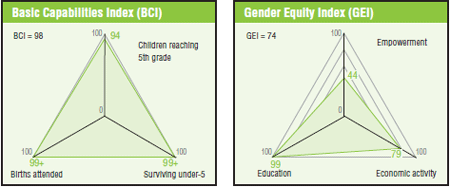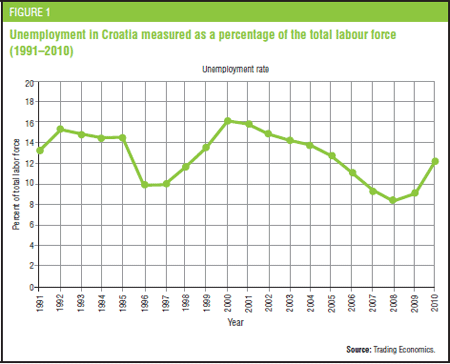Civil society: the sole defender of the public interest
Croatian Law Centre
Inge Perko-Šeparović, Ph.D.
Vjeran Piršić
Eko Kvarner
The global crisis has hit Croatia’s economy hard. The country is experiencing increased poverty and unemployment rates yet the Government is still favouring non-sustainable approaches to development. The authorities seem to serve only the private sector while the people’s well-being has to be defended by civil society organizations, as shown by a successful campaign against the extension of an oil pipeline to the Adriatic Sea. The Government’s Strategy for Sustainable Development is inadequate and the current land, water and forest legislation is not only flawed but also lacks transparency. The country must embrace the cause of sustainable development immediately.
 |
The 2008 global economic crisis had a profound and negative impact on the Croatian economy. Growth dropped from 2.4% in 2008 to -5.8% in 2009 and -1.4% in 2010.[1] At the same time and aggravating the crisis, foreign debt service had reached almost 100% of GDP by 2010, severely limiting continued access to foreign credit.[2]
One of the main negative impacts of the crisis has been increasing unemployment. Between 2005 and 2008 economic growth allowed some job creation but the crisis reversed this situation: in 2010 the unemployment level (measured as a percentage of the total population) was approximately 17.6%.[3]
Poverty rates have also increased. Between 2005 and 2008 poverty was primarily linked to long-term unemployment and inactivity, mostly concentrated among low-skilled workers, but this changed with the crisis.Reduced employment, decreased real income and a salaries’ freeze in the public sector have pushed many people below the poverty line. As a result the “emerging” poor are better educated, younger and economically active.
 |
Defending the environment
Public and private interests continually collide in Croatia. The public interest is being defended solely by civil society while the political elites often serve only private interests. In 2009 the Parliament approved the “Strategy for Sustainable Development of the Republic of Croatia,” which established a series of guidelines and policies regarding sustainable development and also commented on the country’s environmental situation.[4] However, it has been heavily criticized by several civil society organizations, which have pointed out that it does not establish priority goals and lacks benchmarks and indicators of progress.
The crisis has led to so-called “investment hunger” in which the Government aligns with private and foreign investors at the expense of the community as a whole. The capital that is attracted as a result is not a viable source of development since it depends on minimal labour and environmental regulations and typically both reduces and degrades the country’s natural resources.
In this context the problems tend to accumulate. The tendency towards unsustainable use (and abuse) of non-renewable resources is made worse by the Government’s mismanagement.[5] There is a dire need for a national consensus on the issue of resource management, particularly regarding which resources should or should not be used more intensively at this moment without endangering the environment or compromising the needs of future generations.
Land issues
Land is one of the country’s best natural resources, especially on the Adriatic coast. National strategies on the use of land are adopted by Parliament and enforced through the urban planning departments of local and regional governments. Control over the creation of these plans and verification of their acceptability rests with the Ministry of Environmental Protection, Physical Planning and Construction, which has no overall guidelines. This means that there are no good estimates of taxes or regulatory mechanisms to prevent misguided or harmful use of this resource.
An independent analysis of plans for urban developments along the Adriatic coast has established that the current projects enable the settling of 17 million inhabitants. The area is currently inhabited by less than 2 million people so the impact of housing such a large number of newcomers will be enormous. Other research has shown that 750 km (out of 6,000 km) of the Adriatic Sea’s east coast have been urbanized in the last 2,500 years, while current plans for towns and cities will urbanize another 600 km., meaning that the same level of development that took place over two and a half millennia could be almost doubled in a single decade. Agricultural land is also being used for construction as part of urban planning by regional and local governments.
Forests, water and biodiversity
One of the main issues regarding forest management is the absence of official biomass estimates. The numbers vary dramatically: from 700,000 tonnes per year according to the public enterprise Hrvatske Šume (Croatian Forests) to 2 million tonnes per year according to the academic community. Meanwhile Hrvatske Šume keeps the price of wood high and the delivery quantities insufficient, thereby destroying the local wood-processing industry and ultimately causing unemployment and pauperization. The pursuit of the common good, which should be the Government’s main concern, is being neglected for the pursuit of private interests.
This murky picture gets even darker when we consider the issue of water management. The 2009 Strategy for Sustainable Development, for example, lacks a clear definition of the much-invoked “right to water.”[6] Also there has been a series of privatization proposals; the first one failed but the fear of widespread privatization of water resources remains. Some water resources are already being placed in private hands through concessionary contracts that are anything but transparent.
Croatian biodiversity is unprotected, as can be seen for example, in the introduction of foreign species in local ecosystems. This situation is particularly pressing in Cres island where 30 wild boars introduced by hunters multiplied within 10 years to 1,000. The boars not only damage the habitat but attack sheep and lambs, destroying farmers’ livelihoods.[7]
One of the main issues regarding the country’s biodiversity is the lack of reliable information. Croatia is one of the few countries in Europe lacking updated checklists of species or country-specific field guides. Existing species’ inventories (as well as knowledge regarding the local fauna and flora) are inadequate for many purposes, including environmental impact assessments. The nature of subterranean fauna is also very poorly known. This lack of proper inventories and knowledge inevitably limits the scope of any land use or ecosystem management planning that is needed for development projects.
Another case of endangered biodiversity stems from monoculture production, both in agriculture and in forestry. Many endemic species have been lost as they are progressively replaced with foreign ones seen by agro-enterprises as more attractive in the short term.
Environmental controls are not properly enforced
The procedures by which environmental impact assessments are made for new constructions, as well as the requirements for securing permits for expanding or even continuing to operate existing facilities, are both supposed to be strictly regulated by law. Unfortunately all facilities easily avoid the state control system. Moreover since the facilities already in place do not conform to European pollution norms, their owners are granted extensions for adjustment that include transitional periods of up to 12 years.
Such transitional periods are negotiated with the EU as part of the measures needed to grant Croatia’s membership; nevertheless some of the facilities’ are allowed to continue operating the end of their lifecycle. An additional problem stems from the use of substandard raw materials, especially in oil refineries, which causes substantial air pollution in the refineries’ surrounding areas. In 2004 the Ministry issued an order for oil refineries to use better quality raw materials. Although the order was backed by a Court decision, the refineries frequently disobey.
Examples of good practice
Since most of the time the public interest is not protected by the Government, civil society has assumed this task. Although its influence is not strong enough yet, examples of successful interventions should be mentioned.
The Eko Kvarner organization, for example, strongly opposed the proposal to extend the Družba Adria pipeline, which is already the longest in the world and carries oil from Eastern Russia to Belarus, Czech Republic, Germany, Hungary, Poland, Slovakia and Ukraine, through Croatia and Hungary to reach the Adriatic Sea.[8] The projected transfer of oil would have threatened the northern part of the Adriatic Sea and the well-being of people living in this region. Eko Kvarner cast enough doubt on the validity of the environmental impact assessment[9] to ensure that the authorities rejected the proposal.
The latest success concerns a proposed golf course in Istria. Two organizations, Green Action and Green Istria, sued the Ministry of Environmental Protection, Physical Planning and Construction for extending permits to a build a golf course despite a problematic environmental impact assessment. As a result the Administrative Court annulled the permits.
Conclusion
Croatia urgently needs to adopt a sustainable development paradigm. More and better investment in renewable energy sources could be a good start. It is important to build environmentally friendly tourism facilities since tourism plays an important role in Croatia’s economy and at the same time is not viable without a preserved and protected environment. The official policy is supposed to promote protection of the environment but in reality economic interests are favoured over environmental and sustainable ones. Local governments should be encouraged to develop their own projects in order to promote sustainability and environment protection within their jurisdiction.[10]
[1] Countries of the World, Croatia Economy 2011, <www.theodora.com/wfbcurrent/croatia/croatia_economy.html>.
[2]US Department of State, “Background Note: Croatia,” (6 April 2011), <www.state.gov/r/pa/ei/bgn/3166.htm>.
[3] Index Mundi, Croatia unemployment rate, <www.indexmundi.com/croatia/unemployment_rate.html>.
[4] See: <www.mzopu.hr/doc/Strategy_for_Sustainable_Development.pdf>.
[5]The costs and benefits of resource extraction in terms of sustainable development and citizen well-being have not been measured.
[6]The right to sustainable access to safe drinking water and basic sanitation.
[7]P. Ettinger, “The birds are on the money in Croatia,” Wildlife Extra, <www.wildlifeextra.com/go/world/cres-vultures.html#cr>.
[8]Wikipedia, Druzhba pipeline, <en.wikipedia.org/wiki/Druzhba_pipeline>.
[9]OneWorldSEE, Eko Kvaner Announces Public Debate of the ‘Družba Adria’ Project, (16 April 2004), <oneworldsee.org/sq/node/2901>.
[10] Jelena Lončar and Mladen Maradin, Environmental challenges for sustainable development in the Croatian north Adriatic littoral region, (Croatia: 2009), <www.ff.uni-lj.si/>.
| Attachment | Size |
|---|---|
| croatia2012_eng.pdf | 194.82 KB |